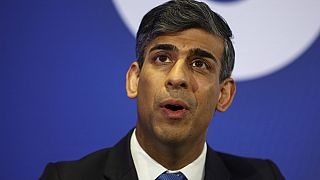United Kingdom
The United Kingdom's controversial plan to send asylum seekers to Rwanda has had a heavy impact on asylum seekers already in the country, according to NGOs working with refugees.
The plan to deport asylum seekers to Rwanda, first announced in 2022, is still being debated in parliament.
While lawmakers argue over the bill's legality, NGOs working with refugees and migrants say that asylum seekers already in the UK have been heavily impacted by the fear that they could be deported to the eastern African nation.
Fear of deportation
Sami is a 20-year-old refugee from Afghanistan who left his home country in 2020, aged 16, after his family was killed.
He arrived in the UK in January 2022 believing his gruelling journey had finally come to an end.
However, in April that year former Prime Minister Boris Johnson announced that anyone who had arrived illegally after January 1, 2022, would be deported to Rwanda, around 6,400 km away.
Sami was devastated by the news.
"I couldn’t eat, I was just stuck in my room," he told Africanews. "I [felt we had made] a wrong decision to come to the UK, now they were going to send us to Rwanda. We were so scared."
He has since had his asylum claim approved and is moving on with his life but many of the friends he had made have since left the UK for neighbouring Ireland where they hope to claim asylum.
Risk of exploitation
NGOs in the UK say that the plan will not achieve the government’s stated aim of stopping traffickers and reducing migration to the UK but instead push vulnerable asylum seekers into further exploitation.
The Refugee Council, a leading charity in the UK working with asylum seekers and refugees, released a report in late 2023 saying that the policy has already led to " refugees disappearing from contact with support organisations" and "causing huge distress, panic and fear".
In a statement to Africanews, Enver Solomon, CEO of the Refugee Council said, that "Not only is the Rwanda plan inhumane and likely to have a devastating impact on the health and wellbeing of people seeking asylum in the UK, but it is also entirely unworkable."
Nick Beales, Head of Campaigns at the Refugee and Migrant Forum of Essex and London (RAMFEL), says that he has seen first-hand with those his organisation works with the impact of the plan.
"The plan is almost certain to see people opting to remain underground and in the shadows rather than bringing themselves to the attention of the authorities," says Beales. "That in turn will see people at greater risk of exploitation, greater risk of forced slavery, everything the government claims that it is trying to prevent."
Further debate
The plan is still being debated in parliament and is set to return to the House of Commons in the coming weeks.
The ruling Conservative Party, led by Prime Minister Rishi Sunak, has vowed to get the first deportation flight airborne by this spring.
In the meantime, asylum seekers are continuing to make dangerous journeys across the English Channel to the UK.
In early March, a 7-year-old girl died after a boat she was in that was attempting to reach British shores capsized.











01:52
In Goma, solar power brings light and hope in Ndosho neighbourhood
02:13
Congo and Rwanda sign a US-mediated peace deal aimed at ending decades of bloody conflict
00:54
African Human Rights court says it can hear case brought by DRC against Rwanda
Go to video
Morocco: United Kingdom withdraws from renewable energy project
01:20
Somalia launches Centennial Vision 2060 roadmap for 'peace, prospertity and progress'
01:52
UN's crucial humanitarian aid work faces a clouded future amid cuts in funds